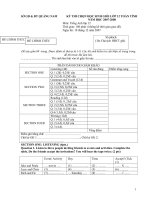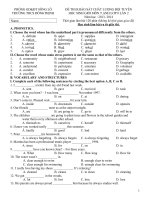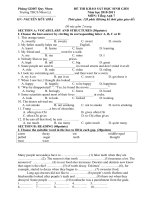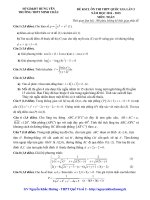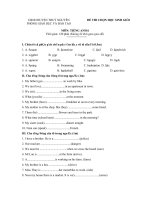Đề kscl hsg 12 anh (ql hm lần 3)
Bạn đang xem bản rút gọn của tài liệu. Xem và tải ngay bản đầy đủ của tài liệu tại đây (616.16 KB, 12 trang )
SỞ GD & ĐT NGHỆ AN
CỤM QUỲNH LƯU–HOÀNG MAI
(Đề thi có 12 trang)
ĐỀ THI KHẢO SÁT ĐỘI TUYỂN HSG TỈNH LỚP 12
LẦN 3 - NĂM HỌC 2021 - 2022
Môn thi: Tiếng Anh
Thời gian làm bài: 150 phút
Họ và tên: ……………………………………………………………………SBD:…………………….
ĐIỂM
Bằng số:……………………
Bằng chữ:………………..…
HỌ TÊN, CHỮ KÍ GIÁM KHẢO
SỐ PHÁCH
Giám khảo 1: ………………………
Giám khảo 2: ………………………
SECTION A. LISTENING (50 points)
Part 1: You will listen to a lecture about the helix shape. For questions 1-15, complete the sentences
WITH NO MORE THAN 3 WORDS / PHRASES. (30pts)
I'd like to turn now to the object which is the main point of this talk: the helix. This is a fascinating
mathematical object which (1)______ many parts of our lives. Movement, the natural world, the
manufactured world and our (2)______ are all connected to the shape of the helix.
A helix is a type of (3)______ curve that goes around a central cylindrical shape in the form of a spiral, like
a corkscrew or a spiral staircase. The helix is a very popular shape in nature because it is very (4)______. In
fact, helices are sometimes (5)______ to as 'nature's space saver'. In architecture too, the helix shape of a
spiral staircase is an attractive option in buildings where space is very (6)______.
The (7)______ type of helix is probably the double helix of DNA, or deoxyribonucleic acid. DNA is made
of two helices that curve around each other, a bit like (8)______. DNA contains the genetic information or
'code' that (9)______ the development and functioning of all known living things. The helix shape is a very
(10)______ way to store a long molecule like DNA in the limited space of a cell.
There are different types of helices. Helices can twist clockwise, right-handed, or (11)______, left-handed.
An interesting experiment is to hold a clockwise helix, such as a corkscrew, up to a mirror. The clockwise
helix appears to become counterclockwise.
We can perceive examples of helices in many areas of our world. Spiral staircases, cables, screws and ropes
can be right-handed or left-handed helices. A helix that (12)______ a cone is called a conical helix.
Examples of conical helices are screws or the famous spiral (13)______ designed by the architect Frank
Lloyd Wright in the Guggenheim Museum in New York.
Helices are also (14)______ in the natural world. The horns of certain animals, viruses, seashells and the
structure of plants, flowers and leaves can all contain helices. The human umbilical cord is in fact a triple
helix.
With the discovery that the helix is the shape of the DNA molecule, it is not surprising that the helix is found
in so many areas. It's one of the most natural shapes in nature.
Let's turn our attention now to the mathematical description of the helix. You'll need a pen and paper for the
next part of the talk as I am going to give you some (15)______ to write down. Take your time to notice the
different ...
Your answers:
1.
4.
7.
10.
13.
3.
6.
9.
12.
15.
2.
5.
8.
11.
14.
1
Part 2: You will hear a radio interview with a ghost hunter called Carlene Belfort. Mark the letter A,
B, C, or D on your answer sheet to indicate the correct answer to each of the following questions from
16 to 25. (20pts)
16. What happened when Carlene was 8 years old?
A. her grandmother died
B. her house caught fire
C. her grandfather had an accident
D. her parents left her
17. How did Carlene become a ghost hunter?
A. she wanted to contact her dead grandmother B. she grew up in a haunted house
C. her parents encouraged her
D. she imitated her idol
18. What, according to Carlene, do ghost hunters need most?
A. a special gift
B. equipment
C. an adventurous mind
D. bravery
19. Who does Carlene mostly work for?
A. people who want reassurance
B. people who want to contact loved ones
C. people who want to find a ghost
D. people who are in need of help
20. What could they see when they looked at the pictures later?
A. furniture flying across the room
B. her colleague’s neck
C. unexpected visitors
D. three streams of energy attacking the camera
21. How does Carlene detect when ghosts are present?
A. she feels cold.
B. she gets evidence from her equipment.
C. she feels them touching her hair.
D. she catches sight of them
22. When is Carlene most afraid?
A. when her equipment breaks
B. when things move on their own
C. when bad spirits are nearby
D. when she faces the ghosts
23. What does Carlene think about people who don’t believe her?
A. she doesn’t understand why they think that.
B. she thinks they don’t have enough evidence.
C. she wants them to experience it for themselves. D. she does not care about what people think
24. What does Carlene feel about her business?
A. she thinks it is meaningless.
B. she realises she is taking advantage of customers.
C. she wants to expand and make more money. D. she feels she is providing a service.
25. How can people contact Carlene if they feel their house is haunted?
A. access her website and arrange for a consultation
B. make her a phone call
C. write her an email
D. come to her house
Your answers:
16.
21.
17.
22.
18.
23.
19.
24.
20.
25.
SECTION B. LEXICO – GRAMMAR (20 points)
Part 1: For questions 1–12, choose the best answer to complete each of the following sentences.
Write A, B, C or D in the corresponding numbered boxes: (12pts)
1. The pair of jeans I bought didn't fit me, so I went to the store and asked for ______.
A. the other ones B. another jeans
C. others ones
D. another pair
2. Students in private school often receive more ______ attention drom their teachers; therefore, they have
more chance to reach their full learning potential.
A. distinctive
B. individual
C. personal
D. unique
2
3. Mike ______ on our conversation to tell us that Andrew had just been rushed to hospital.
A. cut in
B. faced up
C. broke up
D. got ahead
4. The manufacturer is worldly-known for selecting only ingredients that meet their very strict ______ of
quanlity and renewability.
A. necessities
B. demands
C. requirements
D. criteria
5. I thought we were saying goodbye forever. But we ______ again, many years later, under very strange
circumstances.
A. are going to meet B. will meet
C. met
D. were to meet
6. President Donald Mack demanded and got more and more power, although he was ______ unable to use
it effectively.
A. faintly
B. rarely
C. hardly
D. virtually
7. We did have a lot of arguments and disagreements but that’s water ______ now.
A. in the sea
B. down the river
C. under the bridge D. back in the day
8. It’s your decision – you have to ______ the responsibility if things go wrong.
A. bear
B. make
C. maintain
D. carry
9. Right now all the seats on that train are taken, madam. ______ there is a cancellation, I will call you.
A. Nevertheless
B. In the event that C. Even if
D. But
10. Nam and his classmate are at his home now and he woulk like to offer him something to drink.
Nam: "Would you like another drink?"
- John:"______"
A. I wouldn’t say no.
B. You said it!
C. You can say that again.
D. I couldn’t agree more.
Mark the letter A, B, C, or D to indicate the word or phrase that is CLOSEST in meaning to the
underlined part in the following question. Write your answer in the corresponding numbered box.
11. It was when we started living together that we found we just weren’t compatible.
A. well-suited
B. corresponding
C. sociable
D. incompatible
Mark the letter A, B, C, or D to indicate the word or phrase that is OPPOSITE in meaning to the
underlined part in the following question. Write your answer in the corresponding numbered box.
12. He does not pay attention to his lessons and much of the school day is wasted on superfluous activities.
A. excessive
B. redundant
C. dispensable
D. necessary
Your answers:
1.
2.
3.
4.
5.
6.
7.
8.
9.
10.
11.
12.
Part 2: For questions 13-20, read the passage below which contains 8 mistakes. Identify the mistakes
and write the corrections in the corresponding numbered boxes. (8pts)
Line
1
2
3
4
5
6
7
8
9
10
11
Passage
When another old cave is discovered in the south of France, it is not usually news. Rather, it is an
ordinary event. Such discoveries are so frequentlee these days that hardly anybody pays heed to
them. Therefore, when the Lascaux cave complex was discovered in 1940, the world was amazed.
Painted directly on its walls were hundreds of scenes showing how people lived thousands of
years ago. The scenes show people hunt animals, such as bison or wild cats. Other images depict
birds and, most noticeably, horses, which appear in more than 300 wall images, by far
outnumbering all another animals. Early artists drawing these animals accomplished a
monumental and difficult task. They did not limit themselves from the easily accessible walls but
carried their painting materials to spaces that required climbing steep walls and crawling into
narrow passages in the Lascaux complex. Unfortunately, the paintings have been exposed to the
destroyable action of water and temperature changes, which easily wear the images away.
3
12
13
14
15
Because the Lascaux caves have many entrances, air movement has also damaged the images
inside. Although they are not out in the open air, which natural light would have destroyed them
long ago, many of the images have deteriorated and are barely recognizable. To prevent further
damage, the site was closed to tourists in 1963, 23 years after it was discovered.
Your answers:
Line
13.
14.
15.
16.
Mistake
Correction
17.
18.
19.
20.
Line
Mistake
Correction
SECTION C. READING (70 points)
Part 1: For questions 1–15, read the following passage and decide which answer (A, B, C, or D) best
fits each gap. Write your answers in corresponding numbered boxes. (15pts)
In 1967, a research team from an American university (1)______ out to explore the Well of Sacrifice at
Chechen Itza. Unfortunately, however, the water in this well was so dark that it was impossible for divers to
see, so the team had to use filters to clean it.
Just as this work was about to begin, some (2)______ Indians told the team that the well was (3)______ by
the spirit of a rain god. The god was (4)______ as Chic, and they warned the team that Chic would
(5)______ revenge if his home was disturbed. The team listened politely but (6)______ these warnings and
went on with their research. (7)______ the summer, pumps and filters were used, but it wasn’t until
(8)______ months later that the water was clear enough for divers to go down into the well.
When they got (9) ______ to work they began to discover various objects at the (10)______ of the well.
(11)______the things they brought back to the surface were human bones, and by the time they had
(12)______, they had discovered more than 50 skeletons. This was (13)______ that the well had indeed been
used for human sacrifice.
Perhaps it would have been better if the team had (14)______ to the warnings of the Indians, because within
a year, several members of the team had been (15)______ in mysterious accidents.
1. A. put
B. broke
C. set
D. looked
3. A. lived
B. housed
C. resided
D. inhabited
2. A. local
4. A. named
5. A. have
6. A. ignored
7. A. Along
8. A. few
9. A. down
10. A. end
B. natural
B. called
B. make
B. refused
B. Within
B. several
B. through
B. ground
C. near
C. told
C. do
C. denied
C. Throughout
C. various
C. about
C. depth
D. close
D. known
D. take
D. rejected
D. Inside
D. any
D. at
D. bottom
4
11. A. Between
B. Around
C. Within
D. Among
13. A. clear
B. proof
C. evident
D. obvious
15. A. died
B. wounded
C. killed
D. missed
12. A. ended
B. finished
14. A. listened
Your answers:
1.
6.
11.
C. concluded
B. heard
C. noticed
D. achieved
D. watched
2.
3.
4.
5.
12.
13.
14.
15.
7.
8.
9.
10.
Part 2. For questions 16-30, read the text below and think of the word which best fits each space. Use
only ONE word in each space. Write your answers in the corresponding numbered boxes. (15pts)
PANDEMICS IN HISTORY
Serious outbreaks of infection have happened many times throughout history.
(a). In the 14th century, the bubonic plague is thought to have killed anywhere between 30% and 60% of
Europe’s (16)______. In the late 1870s the bubonic plague emerged again, this time in south central China.
Thousands of people were killed in Canton and the bubonic plague spread (17)______rivers and shipping
routes. The pathogen spread to Hawaii and (18)______ to San Francisco, transmitted on a regular trade
route.
(b). The first bubonic plague victim in San Francisco (19)______ lived in the city’s poor, dirty and
overcrowded Chinatown district died in March 1900. An incorrect conspiracy theory at the time was that
people of European descent could (20)______ catch the infection. The reality was that white Americans did
not enter especially deprived areas where Asian populations lived and where the bacteria thrived, so they
were not exposed to the dangers to (21)______ same extent as the migrant workers that lived in those areas.
(c). Although knowledge at the time was limited as to what (22)______ the infection, scientists trying to
contain the outbreak understood that infected areas needed to be quarantined and cleaned. They faced
opposition (23)______ city officials, many of whom wanted to ignore the problem instead. The Governor
of California, who didn’t support the closing of state borders because of the problems it would create for
the $25-million fruit harvest, (24)______ official letters about what he called the ‘fake plague’. Science
however prevailed and experts began to make the (25)______ between the infection and how it was being
passed around the community. It became clear that the problem was caused by flea-infected rats. Actions
were subsequently taken to wipe out the rats and to disinfect the city, old buildings were also (26)______.
(d). By 1905 the city of San Francisco was considered to be safe again;(27)______, a 7.9 magnitude
earthquake in 1906 caused damage to buildings and (28)______ infrastructure which led to a new increase
in infection because the rat population grew again as they took over devastated land and buildings and open
sewers. After another (29)______ effort to close down the infection, San Francisco was finally declared
plague free in November 1908, though the disease was observed to have crossed over from the rat
population to squirrels.
(e). The bubonic plague is still found in the area today. On average around seven people a year are still
infected in the U.S.A., most of them picking up the infection while hiking, but nowadays it can be very
(30)______ treated by antibiotics.
5
Your answers:
16.
17.
18.
19.
22.
25.
28.
21.
24.
27.
30.
20.
23.
26.
29.
Part 3: For questions 31-40, read the following passage and write A, B, C, or D in the boxes to
indicate the correct answer to each of the following questions.
The Moon has been worshipped by primitive peoples and has inspired humans to create everything
from lunar calendars to love sonnets, but what do we really know about it? The most accepted theory
about the origin of the Moon is that it was formed of the debris from a massive collision with the young
Earth about 4.6 billion years ago. A huge body, perhaps the size of Mars, struck the Earth, throwing out
an immense amount of debris that coalesced and cooled in orbit around the Earth.
The development of Earth is inextricably linked to the moon; the Moon's gravitational influence
upon the Earth is the primary cause of ocean tides. In fact, the Moon has more than twice the effect upon
the tides than the Sun does. The Moon makes one rotation and completes a revolution around the Earth
every 27 days, 7 hours, and 43 minutes. This synchronous rotation is caused by an uneven distribution of
mass in the Moon (essentially, it is heavier on one side than the other) and has allowed the Earth's gravity
to keep one side of the Moon permanently facing Earth. It is an average distance from Earth of 384,403
km.
The Moon has no atmosphere; without an atmosphere, the Moon has nothing to protect it from
meteorite impacts, and thus the surface of the Moon is covered with impact craters, both large and
small. The Moon also has no active tectonic or volcanic activity, so the erosive effects of atmospheric
weathering, tectonic shifts, and volcanic upheavals that tend to erase and reform the Earth's surface
features are not at work on the Moon. In fact, even tiny surface features such as the footprint left by an
astronaut in the lunar soil are likely to last for millions of years, unless obliterated by a chance meteorite
strike. The surface gravity of the Moon is about one-sixth that of the Earth's. Therefore, a man weighing
82 kilograms on Earth would only weigh 14 kilograms on the Moon.
The geographical features of the Earth most like that of the Moon are, in fact, places such as the
Hawaiian volcanic craters and the huge meteor crater in Arizona. The climate of the Moon is very unlike
either Hawaii or Arizona, however; in fact the temperature on the Moon ranges between 123 degrees C.
to -233 degrees C.
31. The word "uneven" is closest in meaning to ______.
A. equally distributed
B. orderly
C. heavier
D. not uniform
32. A person on the Moon would weigh less than on the Earth because.
A. the Moon has no active tectonic or volcanic activity B. the surface gravity of the Moon is less
C. of the composition of lunar soil
D. the Moon has no atmosphere
33. According to the passage, the Moon is.
A. protected by a dense atmosphere
B. composed of a few active volcanoes
C. older than the Earth
D. the primary cause of Earth's ocean tides
34. Which of the following can be inferred from the passage?
A. the Moon is not able to support human life.
B. people living in Hawaii and Arizona would feel at home on the Moon.
C. if the Moon had no gravitational influence, the Earth would not have tides.
D. Mars could have been formed in a similar way to the Moon.
35. The word "erase" is closest in meaning to ______.
A. change
B. impact
C. obliterate
D. erupt
6
36. All of the following are true about the Moon EXCEPT.
A. it has a wide range of temperatures
B. it is unable to protect itself from meteorite attacks
C. it has less effect upon the tides than the Sun
D. it is heavier on one side than the other
37. The word "massive" is closest in meaning to______.
A. impressive
B. dense
C. huge
D. unavoidable
38. The word "debris" is closest in meaning to______.
A. rubbish
B. earth
C. satellites
D. moons
39. Why does the author mention "impact craters"?
A. to show the result of the Moon not having an atmosphere.
B. to explain the corrosive effects of atmospheric weathering.
C. to explain why the Moon has no plant life because of meteorites.
D. to show the result of the Moon not having active tectonic or volcanic activity.
40. What is the passage primarily about?
A. the Moon's effect upon the Earth.
B. a comparison of the Moon and the Earth.
C. the origin of the Moon.
D. what we know about the Moon and its differences to Earth.
Your answers:
31.
36.
32.
37.
33.
38.
34.
39.
35.
40.
Part 4: Read the text and do the following tasks. (20pts)
CLIMATE CHANGE AND THE INUIT
The threat posed by climate change in the Arctic and the problems faced by Canada’s Inuit people
A
Unusual incidents are being reported across the Arctic. Inuit families going off on snowmobiles to prepare
their summer hunting camps have found themselves cut off from home by a sea of mud, following early
thaws. There are reports of igloos losing their insulating properties as the snow drips and refreezes, of lakes
draining into the sea as permafrost melts, and sea ice breaking up earlier than usual, carrying seals beyond
the reach of hunters. Climate change may still be a rather abstract idea to most of us, but in the Arctic it is
already having dramatic effects – if summertime ice continues to shrink at its present rate, the Arctic Ocean
could soon become virtually ice-free in summer. The knock-on effects are likely to include more warming,
cloudier skies, increased precipitation and higher sea levels. Scientists are increasingly keen to find out
what’s going on because they consider the Arctic the ‘canary in the mine’ for global warming – a warning
of what’s in store for the rest of the world
B
For the Inuit the problem is urgent. They live in precarious balance with one of the toughest environments
on earth. Climate change, whatever its causes, its direct threat to their way of life. Nobody knows the
Arctic as well as the locals, which is why they are not content simply to stand back and let outside experts
tell them what’s happening. In Canada, where the Inuit people are jealously guarding their hard-won
autonomy in the country’s newest territory, Nunavut; they believe their best hope of survival in this
changing environment lies in combining their ancestral knowledge with the best of modern science. This is
a challenge in itself
C
The Canadian Arctic is a vast, treeless polar desert that’s covered with snow for most of the year. Venture
into this terrain and you get some idea of the hardships facing anyone who calls this home. Farming is out
of the question and nature offers meagre pickings. Humans first settled in the Arctic a mere 4,500 years
ago, surviving by exploiting sea mammals and fish. The environment tested them to the limits: sometimes
7
the colonists were successful, sometimes they failed and vanished. But around a thousand years ago, one
group emerged that was uniquely well adapted to cope with the Arctic environment. These Thule people
moved in from Alaska, bringing kayaks, sledges, dogs, pottery and iron tools. They are the ancestors of
today’s Inuit people
D
Life for the descendants of the Thule people is still harsh. Nunavut is 1.9 million square kilometers of rock
and ice, and a handful of islands around the North Pole. It’s currently home to 2,500 people, all but a
handful of the indigenous Inuit. Over the past 40 years, most have abandoned their nomadic ways and
settled in the territory's 28 isolated communities, but they still rely heavily on nature to provide food and
clothing. Provisions available in local shops have to be flown into Nunavut on one of the most costly air
networks in the world, or brought by supply ship during the few ice-free weeks of summer. It would cost a
family around £7,000 a year to replace meat they obtained themselves through hunting with imported meat.
Economic opportunities are scarce, and for many people, state benefits ate their only income
E
While the Inuit may not actually starve if hunting and trapping are curtailed by climate change, there has
certainly been an impact on people’s health. Obesity, heart disease and diabetes are beginning to appear in
a people for whom these have never before been problems. There has been a crisis of identity as the
traditional skills of hunting, trapping and preparing skins have begun to disappear. In Nunavut’s igloo and
email’ society, where adults who were born in igloos have children who may never have been out on the
land, there’s a high incidence of depression
F
With so much at stake, the Inuit are determined to play a key role in teasing out the mysteries of climate
change in the Arctic. Having survived there for centuries, they believe their wealth of traditional
knowledge is vital to the task. And the Western scientists are starting to draw on this wisdom, increasingly
referred to as ‘Inuit Qaujimajatuqangit’, or IQ. ‘In the early days, scientists ignored us when they came up
here to study anything. They just figured these people don’t know very much so we won’t ask them’ says
John Amagoalik, an Inuit leader and politician. ‘But in recent years IQ has had much more credibility and
weight.’ In fact, it is now a requirement for anyone hoping to get permission to do research that they
consult the communities, who are helping to set the research agenda to reflect their most important
concerns. They can turn down applications from scientists they believe will work against their interests, or
research projects that will impinge too much on their daily lives and traditional activities
G
Some scientists doubt the value of traditional knowledge because the occupation of the Arctic doesn’t go
back far enough. Others, however, point out that the first weather stations in the far north date back just 50
years. There are still huge gaps in our environmental knowledge, and despite the scientific onslaught, many
predictions are more than best guesses. I could help to bridge the gap and resolve the tremendous
uncertainly about how much of what we’re seeing is natural capriciousness and how much is the
consequence of human activity
Questions 41-47
The reading passage above has eight paragraphs, A-G. Choose the correct heading for each
paragraph from the list of headings below. Write the correct number i-x, in the box below.
LIST OF HEADINGS
i. The reaction of the Inuit community to climate change
ii. Understanding of climate change remains limited
8
iii.
iv.
v.
vi.
vii.
viii.
ix.
x.
Alternative sources of essential supplies
Respect for Inuit opinion grows
A healthier choice of food
A difficult landscape
Negative effects on well-being
Alarm caused by unprecedented events in the Arctic
The benefits of an easier existence
Research projects on environment change
Questions 48-50
Do the following statements agree with the information given in the Reading Passage.
Write your answer in the corresponding numbered boxes
TRUE
If the statement agrees with the information
NOT GIVEN
If there is no information on this
FALSE
If the statement contradicts with the information
48. Climate change has undesirable impact on people’s health and they have to face some ailments that
have not been their matters over the past years.
49. The Western scientists have been attracted to do research on the Inuit’s communities in recent years.
50. Scientists will, no doubt, emphasize the significance of traditional knowledge as they have enough
information on the occupation of the Arctic.
Your answers:
41. Para A______
46. Para F______
42. Para B______
47. Para G______
43. Para C______
48.
44. Para D______
49.
45. Para E______
50.
PART IV. WRITING (60 pts)
Part 1: For each of the sentences below, write a new sentence as similar in meaning as possible to the
original sentence, using the word given in capital letters. This word must not be altered in any way.
(10 points)
1. He discontinues his studies because he is poor.
(POVERTY)
His__________________________________________________________________________
2. It seems that John doesn’t really want to go fishing with us.
(MIND)
It__________________________________________________________________________________
3. We only began to see the symtoms of the disease after several weeks. (DID)
Only____________________________________________________________________________
4. It’s almost 6 months since I stopped subscribing to that newspaper.
(SUBSRIPTION)
I_______________________________________________________________________________
5. No one stands a chance of beating Jokovic in this year’s championship. (CONCLUSION)
It’s _________________________________________________________________
9
Part 2:( 20pts)
You had to return home after being out of job for a long time due to the impact of the Covid-19
pandemic. Unfortunately, you got involved in an accident on the way home and you were looked after by
a person you did not know before. Write a special thank-you letter to express your gratitude.
In your letter:
+ introduce yourself and let him/her know why you are writing
+ express your appreciation
+ and offer him/ her to visit your home with his/her family
Write about 80-100 words.
Use your name and address as Nguyen Van An – 69, Le Hong Phong, Vinh City.
……………………………………………………………………………………………………………..
……………………………………………………………………………………………………………..
……………………………………………………………………………………………………………..
……………………………………………………………………………………………………………..
……………………………………………………………………………………………………………..
……………………………………………………………………………………………………………..
……………………………………………………………………………………………………………..
……………………………………………………………………………………………………………..
……………………………………………………………………………………………………………..
……………………………………………………………………………………………………………..
……………………………………………………………………………………………………………..
……………………………………………………………………………………………………………..
……………………………………………………………………………………………………………..
……………………………………………………………………………………………………………..
……………………………………………………………………………………………………………..
……………………………………………………………………………………………………………..
……………………………………………………………………………………………………………..
……………………………………………………………………………………………………………..
……………………………………………………………………………………………………………..
……………………………………………………………………………………………………………..
……………………………………………………………………………………………………………..
……………………………………………………………………………………………………………..
……………………………………………………………………………………………………………..
……………………………………………………………………………………………………………..
……………………………………………………………………………………………………………..
……………………………………………………………………………………………………………..
……………………………………………………………………………………………………………..
10
Part 3: Write a composition at least 350 words on the following topic: (30pts)
Many famous people do a lot of work for charity as a way of advertising themselves. Some people
think this is good for the community, while others think it is a negative.
Discuss both views and give your own opinion.
……………………………………………………………………………………………………………..
……………………………………………………………………………………………………………..
……………………………………………………………………………………………………………..
……………………………………………………………………………………………………………..
……………………………………………………………………………………………………………..
……………………………………………………………………………………………………………..
……………………………………………………………………………………………………………..
……………………………………………………………………………………………………………..
……………………………………………………………………………………………………………..
……………………………………………………………………………………………………………..
……………………………………………………………………………………………………………..
……………………………………………………………………………………………………………..
……………………………………………………………………………………………………………..
……………………………………………………………………………………………………………..
……………………………………………………………………………………………………………..
……………………………………………………………………………………………………………..
……………………………………………………………………………………………………………..
……………………………………………………………………………………………………………..
……………………………………………………………………………………………………………..
……………………………………………………………………………………………………………..
……………………………………………………………………………………………………………..
……………………………………………………………………………………………………………..
……………………………………………………………………………………………………………..
……………………………………………………………………………………………………………..
……………………………………………………………………………………………………………..
……………………………………………………………………………………………………………..
……………………………………………………………………………………………………………..
……………………………………………………………………………………………………………..
……………………………………………………………………………………………………………..
……………………………………………………………………………………………………………..
……………………………………………………………………………………………………………..
……………………………………………………………………………………………………………..
11
……………………………………………………………………………………………………………..
……………………………………………………………………………………………………………..
……………………………………………………………………………………………………………..
……………………………………………………………………………………………………………..
……………………………………………………………………………………………………………..
……………………………………………………………………………………………………………..
……………………………………………………………………………………………………………..
……………………………………………………………………………………………………………..
……………………………………………………………………………………………………………..
……………………………………………………………………………………………………………..
……………………………………………………………………………………………………………..
……………………………………………………………………………………………………………..
……………………………………………………………………………………………………………..
……………………………………………………………………………………………………………..
……………………………………………………………………………………………………………..
……………………………………………………………………………………………………………..
……………………………………………………………………………………………………………..
……………………………………………………………………………………………………………..
……………………………………………………………………………………………………………..
……………………………………………………………………………………………………………..
……………………………………………………………………………………………………………..
……………………………………………………………………………………………………………..
……………………………………………………………………………………………………………..
……………………………………………………………………………………………………………..
……………………………………………………………………………………………………………..
……………………………………………………………………………………………………………..
……………………………………………………………………………………………………………..
……………………………………………………………………………………………………………..
……………………………………………………………………………………………………………..
……………………………………………………………………………………………………………..
……………………………………………………………………………………………………………..
……………………………………………………………………………………………………………..
……………………………………………………………………………………………………………..
……………………………………………………………………………………………
……………………………………………………………………………………………………………..
___ THE END ___
12
